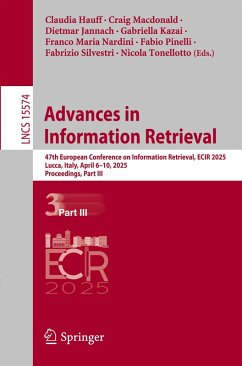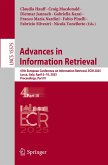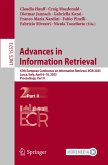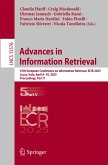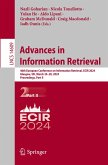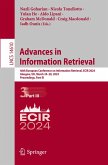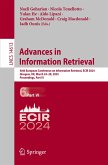Advances in Information Retrieval
47th European Conference on Information Retrieval, ECIR 2025, Lucca, Italy, April 6-10, 2025, Proceedings, Part III
Herausgegeben:Hauff, Claudia; Macdonald, Craig; Jannach, Dietmar; Kazai, Gabriella; Nardini, Franco Maria; Pinelli, Fabio; Silvestri, Fabrizio; Tonellotto, Nicola
Advances in Information Retrieval
47th European Conference on Information Retrieval, ECIR 2025, Lucca, Italy, April 6-10, 2025, Proceedings, Part III
Herausgegeben:Hauff, Claudia; Macdonald, Craig; Jannach, Dietmar; Kazai, Gabriella; Nardini, Franco Maria; Pinelli, Fabio; Silvestri, Fabrizio; Tonellotto, Nicola
- Broschiertes Buch
- Merkliste
- Auf die Merkliste
- Bewerten Bewerten
- Teilen
- Produkt teilen
- Produkterinnerung
- Produkterinnerung
The five-volume set LNCS 15572, 15573, 15574, 15575 and 15576 constitutes the refereed conference proceedings of the 47th European Conference on Information Retrieval, ECIR 2025, held in Lucca, Italy, during April 6 10, 2025.
The 52 full papers, 11 findings, 42 short papers and 76 papers of other types presented in these proceedings were carefully reviewed and selected from 530 submissions. The accepted papers cover the state-of-the-art in information retrieval and recommender systems: user aspects, system and foundational aspects, artificial intelligence and machine learning, applications,…mehr
Andere Kunden interessierten sich auch für
![Advances in Information Retrieval Advances in Information Retrieval]() Advances in Information Retrieval113,99 €
Advances in Information Retrieval113,99 €![Advances in Information Retrieval Advances in Information Retrieval]() Advances in Information Retrieval113,99 €
Advances in Information Retrieval113,99 €![Advances in Information Retrieval Advances in Information Retrieval]() Advances in Information Retrieval113,99 €
Advances in Information Retrieval113,99 €![Advances in Information Retrieval Advances in Information Retrieval]() Advances in Information Retrieval113,99 €
Advances in Information Retrieval113,99 €![Advances in Information Retrieval Advances in Information Retrieval]() Advances in Information Retrieval98,99 €
Advances in Information Retrieval98,99 €![Advances in Information Retrieval Advances in Information Retrieval]() Advances in Information Retrieval98,99 €
Advances in Information Retrieval98,99 €![Advances in Information Retrieval Advances in Information Retrieval]() Advances in Information Retrieval98,99 €
Advances in Information Retrieval98,99 €-
-
-
The five-volume set LNCS 15572, 15573, 15574, 15575 and 15576 constitutes the refereed conference proceedings of the 47th European Conference on Information Retrieval, ECIR 2025, held in Lucca, Italy, during April 6 10, 2025.
The 52 full papers, 11 findings, 42 short papers and 76 papers of other types presented in these proceedings were carefully reviewed and selected from 530 submissions. The accepted papers cover the state-of-the-art in information retrieval and recommender systems: user aspects, system and foundational aspects, artificial intelligence and machine learning, applications, evaluation, new social and technical challenges, and other topics of direct or indirect relevance to search and recommendation.
The 52 full papers, 11 findings, 42 short papers and 76 papers of other types presented in these proceedings were carefully reviewed and selected from 530 submissions. The accepted papers cover the state-of-the-art in information retrieval and recommender systems: user aspects, system and foundational aspects, artificial intelligence and machine learning, applications, evaluation, new social and technical challenges, and other topics of direct or indirect relevance to search and recommendation.
Produktdetails
- Produktdetails
- Lecture Notes in Computer Science 15574
- Verlag: Springer / Springer Nature Switzerland / Springer, Berlin
- Artikelnr. des Verlages: 978-3-031-88713-0
- Seitenzahl: 492
- Erscheinungstermin: 4. April 2025
- Englisch
- Abmessung: 235mm x 155mm x 27mm
- Gewicht: 739g
- ISBN-13: 9783031887130
- ISBN-10: 3031887131
- Artikelnr.: 73425877
- Herstellerkennzeichnung
- Springer-Verlag GmbH
- Tiergartenstr. 17
- 69121 Heidelberg
- ProductSafety@springernature.com
- Lecture Notes in Computer Science 15574
- Verlag: Springer / Springer Nature Switzerland / Springer, Berlin
- Artikelnr. des Verlages: 978-3-031-88713-0
- Seitenzahl: 492
- Erscheinungstermin: 4. April 2025
- Englisch
- Abmessung: 235mm x 155mm x 27mm
- Gewicht: 739g
- ISBN-13: 9783031887130
- ISBN-10: 3031887131
- Artikelnr.: 73425877
- Herstellerkennzeichnung
- Springer-Verlag GmbH
- Tiergartenstr. 17
- 69121 Heidelberg
- ProductSafety@springernature.com
.- exHarmony: Authorship and Citations for Benchmarking the Reviewer Assignment Problem.
.- Unraveling the Impact of Visual Complexity on Search as Learning.
.- Enhancing Utility in Differentially Private Recommendation Data Release via Exponential Mechanism.
.- CountNet: Utilising Repetition Counts in Sequential Recommendation.
.- The Impact of Mainstream-Driven Algorithms on Recommendations for Children.
.- Leveraging Query Terms for Efficient Legal Document Recommendation.
.- Inducing Diversity in Differentiable Search Indexing.
.- EGL-DST: Error-Guided Learning for Multidimensional Evaluation Method of Dialogue State Tracking via GPT-4.
.- Examining the Impact of Transcript Accuracy on Podcast Search and Re-Ranking.
.- Ranking Generated Answers: On the Agreement of Retrieval Models with Humans on Consumer Health Questions.
.- Counterfactual Query Rewriting to Use Historical Relevance Feedback.
.- Improving Language Model Performance by Training on Prototypical Contradictions.
.- LiT and Lean: Distilling Listwise Rerankers into Encoder-Decoder Models.
.- The Impact of Incidental Multilingual Text on the Cross-Lingual Transferring in Monolingual Retrieval.
.- Approximate Bag-of-Words Top-k Corpus Graphs.
.- Gradual Negative Matching for LLM Unlearning.
.- Fact-Driven Health Information Retrieval: Integrating LLMs and Knowledge Graphs to Combat Misinformation.
.- Towards Interpretable Radiology Report Generation via Concept Bottlenecks using a Multi-Agentic RAG.
.- Investigating the Performance of Dense Retrievers for Queries with Numerical Conditions.
.- Hierarchical Skip Decoding for Efficient Autoregressive Language Model.
.- Iterative Self-Training for Code Generation via Reinforced Re-Ranking.
.- Efficient Constant-Space Multi-Vector Retrieval.
.- DiffGR: A Discrete Diffusion-Based Model for Personalised Recommendation by Reconstructing User-Item Bipartite Graphs.
.- BAAF - A Framework for Media Bias Detection.
.- A Simple but Effective Closed-form Solution for Extreme Multi-label Learning.
.- Efficient and Effective Conversational Search with Tail Entity Selection.
.- Large Language Model Can Be a Foundation for Hidden Rationale- Based Retrieval.
.- SAFERec: Self-Attention and Frequency Enriched Model for Next Basket Recommendation.
.- Benchmarking Prompt Sensitivity in Large Language Models.
.- Do LLMs Provide Consistent Answers to Health-Related Questions across Languages?.
.- Rank-DistiLLM: Closing the Effectiveness Gap Between Cross-Encoders and LLMs for Passage Re-ranking.
.- Benchmark Creation for Narrative Knowledge Delta Extraction Tasks: Can LLMs Help?.
.- Passage Segmentation of Documents for Extractive Question Answering.
.- Can Generative AI Adequately Protect Queries? Analyzing the Trade-off Between Privacy Awareness and Retrieval Effectiveness.
.- Retrieval-Augmented Neural Team Formation.
.- A Test Collection for Dataset Retrieval.
.- A new dataset for keyword extraction from IT job descriptions.
.- Entity-Aware Cross-Modal Pretraining for Knowledge-based Visual Question Answering.
.- Patience in Proximity: A Simple Early Termination Strategy for HNSW Graph Traversal in Approximate k-Nearest Neighbor Search.
.- Improving RAG for Personalization with Author Features and Contrastive Examples.
.- E2Rank: Efficient and Effective Layer-wise Reranking.
.- Token-Level Graphs for Short Text Classification.
.- Investigating the Scalability of Approximate Sparse Retrieval Algorithms to Massive Datasets.
.- A Comparative Analysis of Retrieval-Augmented Generation and Crowdsourcing for Fact-Checking.
.- Exploring the Effectiveness of Multi-stage Fine-tuning for Cross-encoder Re-rankers.
.- Unraveling the Impact of Visual Complexity on Search as Learning.
.- Enhancing Utility in Differentially Private Recommendation Data Release via Exponential Mechanism.
.- CountNet: Utilising Repetition Counts in Sequential Recommendation.
.- The Impact of Mainstream-Driven Algorithms on Recommendations for Children.
.- Leveraging Query Terms for Efficient Legal Document Recommendation.
.- Inducing Diversity in Differentiable Search Indexing.
.- EGL-DST: Error-Guided Learning for Multidimensional Evaluation Method of Dialogue State Tracking via GPT-4.
.- Examining the Impact of Transcript Accuracy on Podcast Search and Re-Ranking.
.- Ranking Generated Answers: On the Agreement of Retrieval Models with Humans on Consumer Health Questions.
.- Counterfactual Query Rewriting to Use Historical Relevance Feedback.
.- Improving Language Model Performance by Training on Prototypical Contradictions.
.- LiT and Lean: Distilling Listwise Rerankers into Encoder-Decoder Models.
.- The Impact of Incidental Multilingual Text on the Cross-Lingual Transferring in Monolingual Retrieval.
.- Approximate Bag-of-Words Top-k Corpus Graphs.
.- Gradual Negative Matching for LLM Unlearning.
.- Fact-Driven Health Information Retrieval: Integrating LLMs and Knowledge Graphs to Combat Misinformation.
.- Towards Interpretable Radiology Report Generation via Concept Bottlenecks using a Multi-Agentic RAG.
.- Investigating the Performance of Dense Retrievers for Queries with Numerical Conditions.
.- Hierarchical Skip Decoding for Efficient Autoregressive Language Model.
.- Iterative Self-Training for Code Generation via Reinforced Re-Ranking.
.- Efficient Constant-Space Multi-Vector Retrieval.
.- DiffGR: A Discrete Diffusion-Based Model for Personalised Recommendation by Reconstructing User-Item Bipartite Graphs.
.- BAAF - A Framework for Media Bias Detection.
.- A Simple but Effective Closed-form Solution for Extreme Multi-label Learning.
.- Efficient and Effective Conversational Search with Tail Entity Selection.
.- Large Language Model Can Be a Foundation for Hidden Rationale- Based Retrieval.
.- SAFERec: Self-Attention and Frequency Enriched Model for Next Basket Recommendation.
.- Benchmarking Prompt Sensitivity in Large Language Models.
.- Do LLMs Provide Consistent Answers to Health-Related Questions across Languages?.
.- Rank-DistiLLM: Closing the Effectiveness Gap Between Cross-Encoders and LLMs for Passage Re-ranking.
.- Benchmark Creation for Narrative Knowledge Delta Extraction Tasks: Can LLMs Help?.
.- Passage Segmentation of Documents for Extractive Question Answering.
.- Can Generative AI Adequately Protect Queries? Analyzing the Trade-off Between Privacy Awareness and Retrieval Effectiveness.
.- Retrieval-Augmented Neural Team Formation.
.- A Test Collection for Dataset Retrieval.
.- A new dataset for keyword extraction from IT job descriptions.
.- Entity-Aware Cross-Modal Pretraining for Knowledge-based Visual Question Answering.
.- Patience in Proximity: A Simple Early Termination Strategy for HNSW Graph Traversal in Approximate k-Nearest Neighbor Search.
.- Improving RAG for Personalization with Author Features and Contrastive Examples.
.- E2Rank: Efficient and Effective Layer-wise Reranking.
.- Token-Level Graphs for Short Text Classification.
.- Investigating the Scalability of Approximate Sparse Retrieval Algorithms to Massive Datasets.
.- A Comparative Analysis of Retrieval-Augmented Generation and Crowdsourcing for Fact-Checking.
.- Exploring the Effectiveness of Multi-stage Fine-tuning for Cross-encoder Re-rankers.
.- exHarmony: Authorship and Citations for Benchmarking the Reviewer Assignment Problem.
.- Unraveling the Impact of Visual Complexity on Search as Learning.
.- Enhancing Utility in Differentially Private Recommendation Data Release via Exponential Mechanism.
.- CountNet: Utilising Repetition Counts in Sequential Recommendation.
.- The Impact of Mainstream-Driven Algorithms on Recommendations for Children.
.- Leveraging Query Terms for Efficient Legal Document Recommendation.
.- Inducing Diversity in Differentiable Search Indexing.
.- EGL-DST: Error-Guided Learning for Multidimensional Evaluation Method of Dialogue State Tracking via GPT-4.
.- Examining the Impact of Transcript Accuracy on Podcast Search and Re-Ranking.
.- Ranking Generated Answers: On the Agreement of Retrieval Models with Humans on Consumer Health Questions.
.- Counterfactual Query Rewriting to Use Historical Relevance Feedback.
.- Improving Language Model Performance by Training on Prototypical Contradictions.
.- LiT and Lean: Distilling Listwise Rerankers into Encoder-Decoder Models.
.- The Impact of Incidental Multilingual Text on the Cross-Lingual Transferring in Monolingual Retrieval.
.- Approximate Bag-of-Words Top-k Corpus Graphs.
.- Gradual Negative Matching for LLM Unlearning.
.- Fact-Driven Health Information Retrieval: Integrating LLMs and Knowledge Graphs to Combat Misinformation.
.- Towards Interpretable Radiology Report Generation via Concept Bottlenecks using a Multi-Agentic RAG.
.- Investigating the Performance of Dense Retrievers for Queries with Numerical Conditions.
.- Hierarchical Skip Decoding for Efficient Autoregressive Language Model.
.- Iterative Self-Training for Code Generation via Reinforced Re-Ranking.
.- Efficient Constant-Space Multi-Vector Retrieval.
.- DiffGR: A Discrete Diffusion-Based Model for Personalised Recommendation by Reconstructing User-Item Bipartite Graphs.
.- BAAF - A Framework for Media Bias Detection.
.- A Simple but Effective Closed-form Solution for Extreme Multi-label Learning.
.- Efficient and Effective Conversational Search with Tail Entity Selection.
.- Large Language Model Can Be a Foundation for Hidden Rationale- Based Retrieval.
.- SAFERec: Self-Attention and Frequency Enriched Model for Next Basket Recommendation.
.- Benchmarking Prompt Sensitivity in Large Language Models.
.- Do LLMs Provide Consistent Answers to Health-Related Questions across Languages?.
.- Rank-DistiLLM: Closing the Effectiveness Gap Between Cross-Encoders and LLMs for Passage Re-ranking.
.- Benchmark Creation for Narrative Knowledge Delta Extraction Tasks: Can LLMs Help?.
.- Passage Segmentation of Documents for Extractive Question Answering.
.- Can Generative AI Adequately Protect Queries? Analyzing the Trade-off Between Privacy Awareness and Retrieval Effectiveness.
.- Retrieval-Augmented Neural Team Formation.
.- A Test Collection for Dataset Retrieval.
.- A new dataset for keyword extraction from IT job descriptions.
.- Entity-Aware Cross-Modal Pretraining for Knowledge-based Visual Question Answering.
.- Patience in Proximity: A Simple Early Termination Strategy for HNSW Graph Traversal in Approximate k-Nearest Neighbor Search.
.- Improving RAG for Personalization with Author Features and Contrastive Examples.
.- E2Rank: Efficient and Effective Layer-wise Reranking.
.- Token-Level Graphs for Short Text Classification.
.- Investigating the Scalability of Approximate Sparse Retrieval Algorithms to Massive Datasets.
.- A Comparative Analysis of Retrieval-Augmented Generation and Crowdsourcing for Fact-Checking.
.- Exploring the Effectiveness of Multi-stage Fine-tuning for Cross-encoder Re-rankers.
.- Unraveling the Impact of Visual Complexity on Search as Learning.
.- Enhancing Utility in Differentially Private Recommendation Data Release via Exponential Mechanism.
.- CountNet: Utilising Repetition Counts in Sequential Recommendation.
.- The Impact of Mainstream-Driven Algorithms on Recommendations for Children.
.- Leveraging Query Terms for Efficient Legal Document Recommendation.
.- Inducing Diversity in Differentiable Search Indexing.
.- EGL-DST: Error-Guided Learning for Multidimensional Evaluation Method of Dialogue State Tracking via GPT-4.
.- Examining the Impact of Transcript Accuracy on Podcast Search and Re-Ranking.
.- Ranking Generated Answers: On the Agreement of Retrieval Models with Humans on Consumer Health Questions.
.- Counterfactual Query Rewriting to Use Historical Relevance Feedback.
.- Improving Language Model Performance by Training on Prototypical Contradictions.
.- LiT and Lean: Distilling Listwise Rerankers into Encoder-Decoder Models.
.- The Impact of Incidental Multilingual Text on the Cross-Lingual Transferring in Monolingual Retrieval.
.- Approximate Bag-of-Words Top-k Corpus Graphs.
.- Gradual Negative Matching for LLM Unlearning.
.- Fact-Driven Health Information Retrieval: Integrating LLMs and Knowledge Graphs to Combat Misinformation.
.- Towards Interpretable Radiology Report Generation via Concept Bottlenecks using a Multi-Agentic RAG.
.- Investigating the Performance of Dense Retrievers for Queries with Numerical Conditions.
.- Hierarchical Skip Decoding for Efficient Autoregressive Language Model.
.- Iterative Self-Training for Code Generation via Reinforced Re-Ranking.
.- Efficient Constant-Space Multi-Vector Retrieval.
.- DiffGR: A Discrete Diffusion-Based Model for Personalised Recommendation by Reconstructing User-Item Bipartite Graphs.
.- BAAF - A Framework for Media Bias Detection.
.- A Simple but Effective Closed-form Solution for Extreme Multi-label Learning.
.- Efficient and Effective Conversational Search with Tail Entity Selection.
.- Large Language Model Can Be a Foundation for Hidden Rationale- Based Retrieval.
.- SAFERec: Self-Attention and Frequency Enriched Model for Next Basket Recommendation.
.- Benchmarking Prompt Sensitivity in Large Language Models.
.- Do LLMs Provide Consistent Answers to Health-Related Questions across Languages?.
.- Rank-DistiLLM: Closing the Effectiveness Gap Between Cross-Encoders and LLMs for Passage Re-ranking.
.- Benchmark Creation for Narrative Knowledge Delta Extraction Tasks: Can LLMs Help?.
.- Passage Segmentation of Documents for Extractive Question Answering.
.- Can Generative AI Adequately Protect Queries? Analyzing the Trade-off Between Privacy Awareness and Retrieval Effectiveness.
.- Retrieval-Augmented Neural Team Formation.
.- A Test Collection for Dataset Retrieval.
.- A new dataset for keyword extraction from IT job descriptions.
.- Entity-Aware Cross-Modal Pretraining for Knowledge-based Visual Question Answering.
.- Patience in Proximity: A Simple Early Termination Strategy for HNSW Graph Traversal in Approximate k-Nearest Neighbor Search.
.- Improving RAG for Personalization with Author Features and Contrastive Examples.
.- E2Rank: Efficient and Effective Layer-wise Reranking.
.- Token-Level Graphs for Short Text Classification.
.- Investigating the Scalability of Approximate Sparse Retrieval Algorithms to Massive Datasets.
.- A Comparative Analysis of Retrieval-Augmented Generation and Crowdsourcing for Fact-Checking.
.- Exploring the Effectiveness of Multi-stage Fine-tuning for Cross-encoder Re-rankers.

